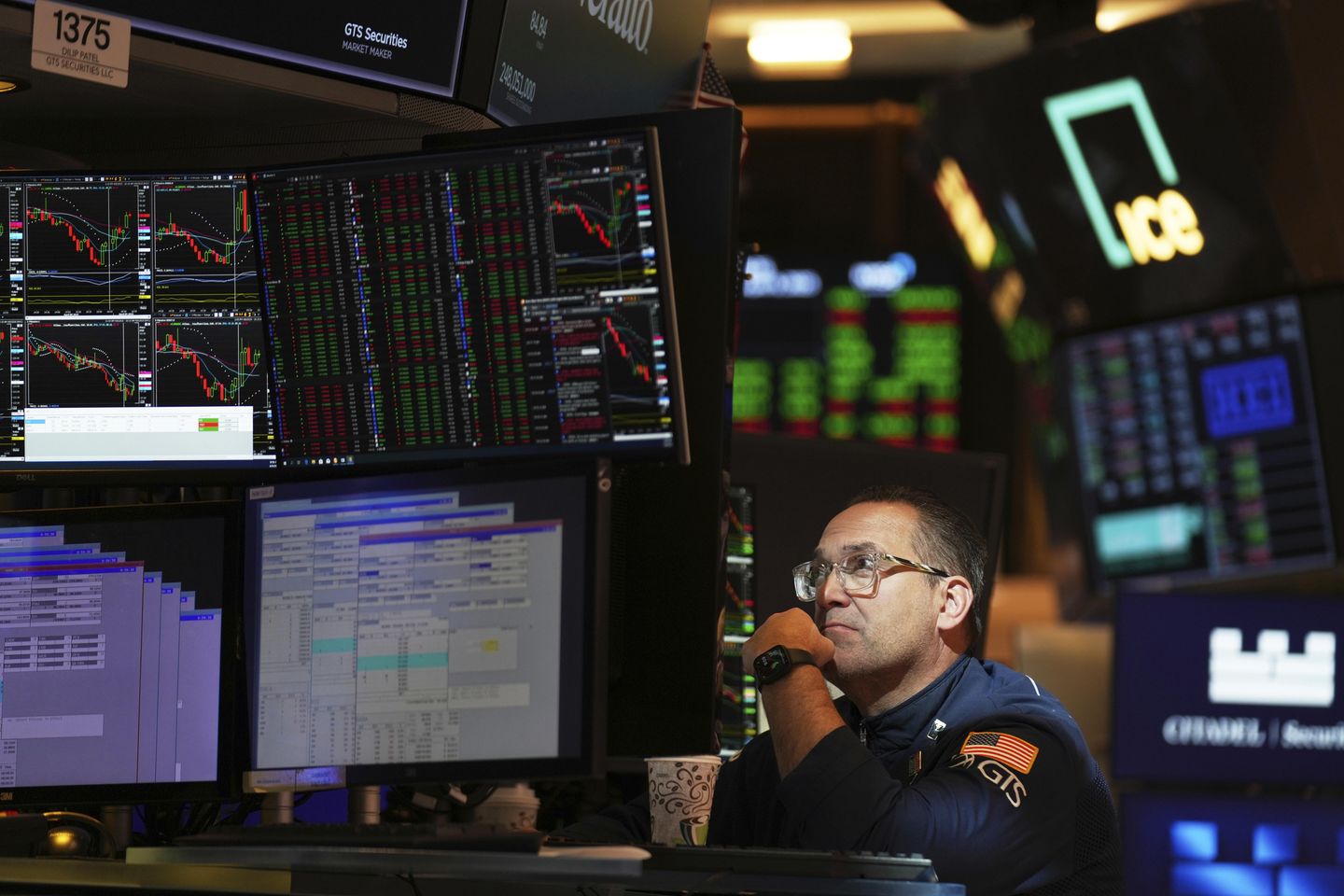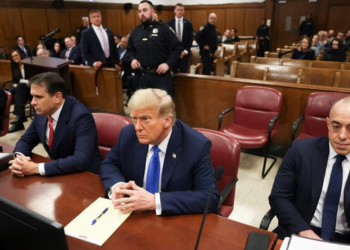
NEW YORK — The U.S. stock market is shaking in another twitchy day of trading after most other markets tumbled Wednesday as President Donald Trump’s trade war keeps escalating.
The S&P 500 was down 0.7% in midday trading after quivering at the start of trading. The index at the center of many 401(k) accounts swung from an initial loss of 0.5% to a gain of 1.4% and back down, all in less than an hour after trading opened.
The Dow Jones Industrial Average was down 263 points, or 0.7%, as of 11 a.m. Eastern time, and the Nasdaq composite was 0.2% higher.
Huge swings have become routine for financial markets worldwide recently, not just day to day but hour to hour, as investors struggle to game out what Trump’s trade war will do to the economy. On Tuesday, the S&P 500 careened between a gain of 4.1% and a loss of 3% for a second straight day of shocking reversals.
Wall Street’s latest moves came after Trump’s latest round of tariffs kicked in after midnight for imports from around the world. That included a 104% tax on things coming from China, and the world’s second-largest economy quickly retaliated by saying it would raise tariffs on U.S. goods to 84% on Thursday.
“If the U.S. insists on further escalating its economic and trade restrictions, China has the firm will and abundant means to take necessary countermeasures and fight to the end” the Ministry of Commerce said.
Such aggressive brinkmanship between the world’s two largest economies is raising fears that tariffs will stick around for a while, which economists and investors expect would create a recession. The European Union on Wednesday also approved tariffs affecting $23 billion in U.S. goods in its own retaliatory move.
Some hope still does remain on Wall Street that Trump could lower his tariffs following negotiations with other countries, which is what’s helping to send stock prices upward at times.
“BE COOL!” Trump said on his Truth Social platform shortly after trading began on Wall Street. “Everything is going to work out well. The USA will be bigger and better than ever before!”
Investors notoriously hate dealing with uncertainty about the economy, and “there are so many moving parts at the moment, it’s hard to keep track,” said JJ Kinahan, chief executive officer of Tastytrade from IG.
Some of Wednesday’s strongest action was in the U.S. bond market, where Treasury yields rose sharply again. The yield on the 10-year Treasury climbed to 4.38% from 4.26% late Tuesday and from just 4.01% at the end of last week. It approached 4.50% earlier in the morning. That’s a huge move for the bond market and could be an indication of stress.
Analysts say several reasons could be behind the move, including hedge funds and other investors having to sell their Treasury bonds to raise cash in order to make up for losses in the stock market. Investors outside the United States may also be selling their U.S. Treasurys because of the trade war. Such actions would push down prices for Treasurys, which in turn would push up their yields.
Regardless of the reasons behind it, the higher yields on Treasurys add pressure on the stock market and will likely push up rates for mortgages and other loans for U.S. households. Before trading on Wall Street opened Wednesday, futures for the S&P 500 and other U.S. stock indexes pared steep losses as Treasury yields pared their big gains.
The moves are notable because U.S. Treasury bonds have historically been seen as some of the safest possible investments, and their yields have tended to fall – not rise – during scary times for the market. Of course, even with this week’s sharp rise, the yield on the 10-year Treasury is only back to where it was a couple weeks ago.
Other moves in financial markets were also counterintuitive Wednesday. Oil prices tumbled, with a barrel of benchmark U.S. crude falling below $57 from more than $71 a week ago. That’s an indication of fears about a weakening global economy burning less fuel. But the price for another basic building block for the economy, copper, rose.
All the uncertainty about tariffs is already making planning more difficult for big U.S. companies.
Delta Air Lines pulled financial forecasts for 2025 Wednesday as the trade war scrambles expectations for business and household spending and depresses bookings across the travel sector.
“With broad economic uncertainty around global trade, growth has largely stalled,” CEO Ed Bastian said in a statement on Wednesday. “In this slower-growth environment, we are protecting margins and cash flow by focusing on what we can control.”
Walmart, though, said it’s sticking with its forecasts for sales and operating income over the full year.
In stock markets abroad, indexes tumbled across most of Europe and much of Asia.
London’s FTSE 100 dropped 3.1%, Tokyo’s Nikkei 225 sank 3.9% and the CAC 40 fell 3.3% in Paris.
Chinese stocks were an outlier, and indexes rose 0.7% in Hong Kong and 1.3% in Shanghai.
___
AP Business Writers Matt Ott and Elaine Kurtenbach contributed.












